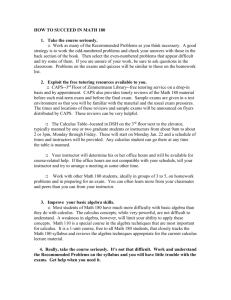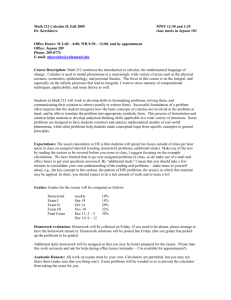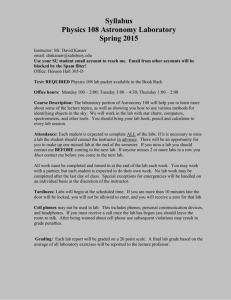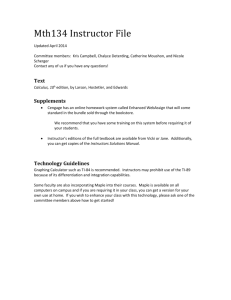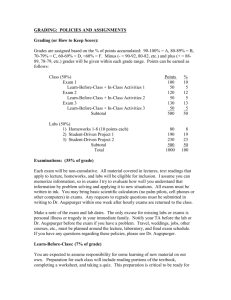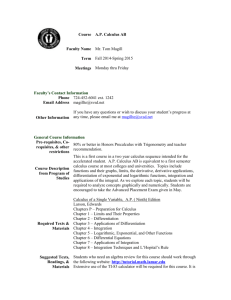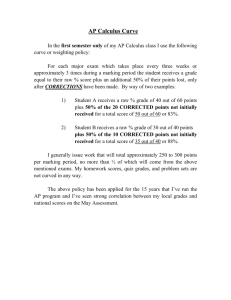THE UNIVERSITY OF BRITISH COLUMBIA
advertisement
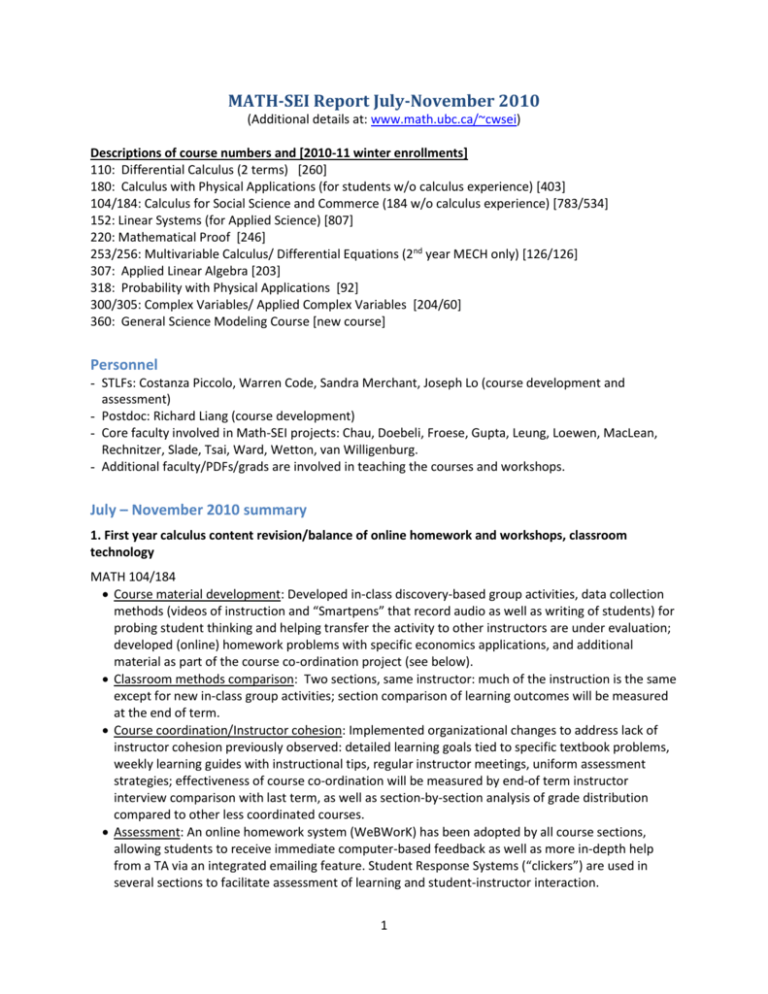
MATH-SEI Report July-November 2010 (Additional details at: www.math.ubc.ca/~cwsei) Descriptions of course numbers and [2010-11 winter enrollments] 110: Differential Calculus (2 terms) [260] 180: Calculus with Physical Applications (for students w/o calculus experience) [403] 104/184: Calculus for Social Science and Commerce (184 w/o calculus experience) [783/534] 152: Linear Systems (for Applied Science) [807] 220: Mathematical Proof [246] 253/256: Multivariable Calculus/ Differential Equations (2nd year MECH only) [126/126] 307: Applied Linear Algebra [203] 318: Probability with Physical Applications [92] 300/305: Complex Variables/ Applied Complex Variables [204/60] 360: General Science Modeling Course [new course] Personnel - STLFs: Costanza Piccolo, Warren Code, Sandra Merchant, Joseph Lo (course development and assessment) - Postdoc: Richard Liang (course development) - Core faculty involved in Math-SEI projects: Chau, Doebeli, Froese, Gupta, Leung, Loewen, MacLean, Rechnitzer, Slade, Tsai, Ward, Wetton, van Willigenburg. - Additional faculty/PDFs/grads are involved in teaching the courses and workshops. July – November 2010 summary 1. First year calculus content revision/balance of online homework and workshops, classroom technology MATH 104/184 Course material development: Developed in-class discovery-based group activities, data collection methods (videos of instruction and “Smartpens” that record audio as well as writing of students) for probing student thinking and helping transfer the activity to other instructors are under evaluation; developed (online) homework problems with specific economics applications, and additional material as part of the course co-ordination project (see below). Classroom methods comparison: Two sections, same instructor: much of the instruction is the same except for new in-class group activities; section comparison of learning outcomes will be measured at the end of term. Course coordination/Instructor cohesion: Implemented organizational changes to address lack of instructor cohesion previously observed: detailed learning goals tied to specific textbook problems, weekly learning guides with instructional tips, regular instructor meetings, uniform assessment strategies; effectiveness of course co-ordination will be measured by end-of term instructor interview comparison with last term, as well as section-by-section analysis of grade distribution compared to other less coordinated courses. Assessment: An online homework system (WeBWorK) has been adopted by all course sections, allowing students to receive immediate computer-based feedback as well as more in-depth help from a TA via an integrated emailing feature. Student Response Systems (“clickers”) are used in several sections to facilitate assessment of learning and student-instructor interaction. 1 Student Attitude Assessment: Developed a Mathematics attitude assessment tool for measuring student approaches in problem solving and general interest and beliefs about Mathematics; collected first round of data. MATH 110 Course material development and assessment: Detailed course learning goals have been developed, all course components are being reviewed for consistency; assessment of workshop structure and pedagogy is underway via student surveys/interviews and class observations; a basic skills diagnostic test has been adopted, new material developed based on test results. Classroom methods: in-class technology (clickers) and online tools (wiki discussion boards, online homework) have been adopted to facilitate group discussions and promote student engagement with material. Assessment: An online homework system (WeBWorK) has been adopted by all course sections, allowing students to receive immediate computer-based feedback as well as more in-depth help from a TA via an integrated emailing feature. Student Response Systems (“clickers”) are used in several sections to facilitate assessment of learning and student-instructor interaction. Further assessment: student surveys on attitudes towards Mathematics, study habits, course engagement. MATH 180/184 Workshops: The Calculus Workshops program, now in its third year of implementation, has undergone substantial changes in organization, management, and content, resulting in measurable improvements of students’ attitudes and engagement in the problem-solving activities. A more efficient structure for management and content development, content alignment with lectures, a new problem database, have all been implemented and documented for continued success. Progressively reduced support needed from the STLF indicates sustainability for the future. Surveys indicate continued positive attitudes from students for the workshops. 2. Tracking and improving key skills through the curriculum MATH 220: A required course for most mathematics and combined majors, as well as statistics majors, was chosen for extensive assessment and follow-up measurement of retention. Interviews with past instructors/students, analysis of exams, and problem-solving workshops have all been used to identify student difficulties and guide future instruction and new material. Proof skills development and retention studies will be conducted in upper-level courses. Student performance 300-level courses in which MATH 220 skills are used was tracked and correlated with grades in MATH 220 to identify the most suitable courses for future proof skills retention studies. Course material development: Course transformation activities include development of detailed learning goals, now under revision by Math and Statistics instructors, in-class activities and student surveys and interviews. Assessment: A new diagnostic tool to assess logic, proof skills and basic computation skills was developed and is being used as a pre/post test to track learning gains and in the future will be used to measure retention. Furthermore, data on students’ attitudes towards learning and doing Mathematics has been collected, and will be analysed to determine the extent to which attitudes in this course are changing. 2 3. Incorporating computational skills MATH 152 Matlab Computer Labs: Course material development: Revised Computer labs used; the new Matlab-based computer labs are better aligned with lectures and designed with more attention to the novice programming level of most students. New pre/post test of basic Matlab skills used in the labs, new Matlab questions were used on tests and homework. Assessment: At the conclusion of this multi-year project, our assessments indicate that the new Matlab-based computer labs are better aligned with lectures, designed with more attention to the novice programming level of most students, and retention of basic syntax is strengthened with paper-based questions on homework. Pre/post lab tests and a measurement of retention all showed substantial learning gains and improved retention. MATH 253/256 (MECH2) Course material development: Developed course and lab learning goals, revised computer labs Assessment: lab observations, student surveys. Preliminary results indicate the need for further improvements of the labs to better target the lab activities at strengthening relevant skills. MATH 307 Course material development: Further revision of lecture notes to address students’ difficulties is underway; online diagnostic assignments have been developed on key topics. Assessment: Student surveys are planned for the end of term. 4. New courses in mathematics in applications MATH 305/300 Course material development: Developed new course material for MATH 305, including course learning goals, lecture notes for distribution, diagnostic assignment on series. Assessment: Preliminary comparison between engineering vs. math/science students in MATH 305/300 suggests that engineering students outperform science students. MATH 360: Developed course-level learning goals and main course topics for approval by the Science Curriculum committee. 5. Additional activities Lunch Series for Teaching and Learning: Co-organized by STLFs, this lunch series has had an open invitation to all members of the department interested in discussing teaching and learning. Complementary IT course tools development (funded by UBC Central, FoS, and Math): Course materials archive and WebWork improvements; expansion of basic skills testing and support of module development. Lessons learned The work done on the new labs and workshops has showed that alignment between the various components of a course (labs, workshops, assignments, tests) is critical for delivering effective instruction that leads to learning and retention. While it is easy to let one or more components of a course drift apart, efforts should be made to make sure that all parts of a course fit well together. 3 As we approach the end of some of our projects, we have tried to develop strategies for an effective transfer of information on the implementation of transformed course activities to new instructors. This can be challenging; we found that documenting and archiving material, as we did for the Calculus workshops, are key elements in developing a sustainable program. While moving on to a higher-level course, students may lack skills that are assumed by instructors and this greatly impedes their performance in the course. For example, in MATH 220 many students show weaknesses in algebra skills involving inequalities and absolute values, and some general logical reasoning such as recognizing that an implication and its converse are not logically equivalent. Similarly, in MATH 307 some students lack a reasonable level of mastery of complex numbers. Coding exams for errors and administering a diagnostic test at the start of the course are helpful activities in illuminating these weaknesses and informing instructors. Anecdotal evidence suggests that when students are introduced to an entirely different style of mathematics, i.e. writing proofs vs. computational problems, they need more than the usual guidance in terms of expectations on exams and homework. We think course learning goals provide some help in this area, but more needs to be done (ex. practice exams, providing marking rubrics, additional worked examples, etc.). 4 Plans for 2011 Projects First year calculus content revision, and balance of online homework and workshops, classroom technology Tracking of basic algebra skills and undermotivated students Tracking proof skills Tracking series skills Tracking modeling skills Incorporating computational skills Project based courses Plans MATH 180/184 Workshops: - Collect student data from final exams and compare performance with past years. - Complete documentation for sustainability of workshop TA training program. MATH 104/184: - Complete instructor interviews, compare results with past data; perform section-bysection analysis of grade distribution compared to other less coordinated courses. - Analyse student data collected during in-class discovery-based activities. - Compare student performance (on exams, clicker questions) and attitudes in different sections taught by same instructor to assess effectiveness of different instructional methods. - Conduct student interviews to validate attitude assessment tool. MATH 110: Compete the two-semester long assessment, which includes class observations, student surveys/interviews, course material revision, and analysis of student performance on exams. MATH 220: - Complete revision of learning goals; assess how students use learning goals. - Develop additional in-class activities. - Review/improve diagnostic test; administer test to selected 300-level courses. - Conduct “think-aloud” sessions to get insight into students' proof writing processes. MATH 101: Develop learning goals and course material for series (in cooperation with CTLT) MATH 264: (new course) a 1-credit course on vector calculus, embedded in an Electromagnetics course; focus will be on assessing the effectiveness of the integration between the lectures of the Math course and the E&M course, as well as assessing students’ mastery of skills in mathematical E&M modeling. MATH 300/305: - Revise learning goals, complete set of lecture notes for distribution. - Further data analysis to determine whether science/math students have the necessary skills to acquire mastery of course material in the new one-semester course as opposed to the traditional two-semester MATH 300/301 sequence. MATH 253/256: - Complete revision of labs; develop & administer Matlab diagnostic test/lab activity. - Conduct lab observations; administer student surveys, compare with past data. MATH 307: - Develop additional tutorials & homework for developing/assessing basic programming skills. - Document changes and archive material. MATH 318: - Develop additional set of computational homework and exams. - Analyse performance on homework/exams, refine surveys to gather more information. MATH 358: (new course) co-listed and team taught by Math and Mech, it covers basic PDE methods with specific Mech applications, and includes a computer lab component; focus will be on assessing the level of coordination between theory and application, lectures and labs. MATH 4xx: (new course) currently in development, it will cover computational/PDE methods aimed at Engineering Physics and Honors students; assessment will focus on the integrated computational and theory curriculum. MATH 360: - Create topic-level learning goals - Develop in-class activities/computer simulation projects that target key concepts in the course. - Revise material while course is taught 5 6

